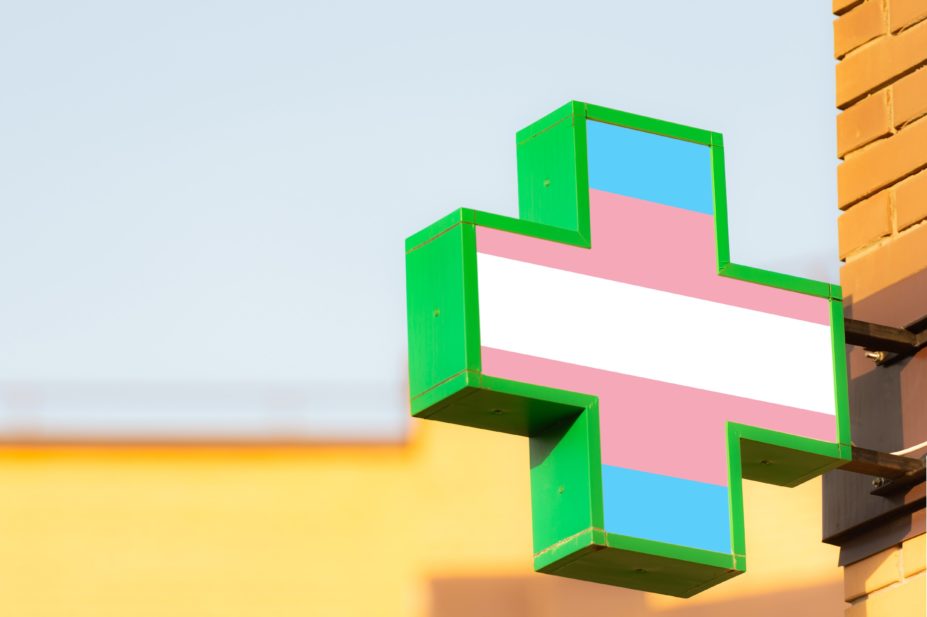
Mclean/Shutterstock.com
“It’s going to change lives.” These were the words of one campaigner as the UK’s newest gender identity service opened its doors in September 2019.
Based in St David’s Hospital in Cardiff, the new multidisciplinary Welsh Gender Team will provide medical treatment and support for transgender patients, many of whom have previously had to travel more than a hundred miles to London for specialist care.
Many advocates for trans people insist that there is still a dire lack of care in the UK
The service has been hailed as a step in the right direction by GPs at the British Medical Association Cymru Wales. However, many advocates for trans people, including transgender youth charity Mermaids UK and specialist service provider Gender GP, insist that there is still a dire lack of care in the UK.
There are currently only eight gender identity clinics in England that provide assessments, hormone prescriptions and specialist ongoing support to trans patients. This handful of clinics has witnessed a 240% upsurge in demand for their services over the past five years, according to NHS England, with 7,500 adults currently on waiting lists[1]
.
A report by the Women and Equalities select committee in 2016 found that waiting times were “unacceptable,” extending to as long as two years for treatment in some cases[2]
.
Summarising the situation in the UK, a spokesperson for Mermaids UK, a British charity and advocacy group supporting gender variant and transgender youth, says: “The current Gender Identity Development Service is woefully underfunded and under-resourced.”
A role for pharmacists
The 2018 review of gender identity services by NHS England and NHS Scotland uncovered a lack of training and education of healthcare professionals across various disciplines[3]
.
However, despite NHS England stipulating that the gender identity care pathway should involve a multidisciplinary team, the role of pharmacists appears to be limited[4]
.
Caroline Dada, lead pharmacist for community services, patient experience and gender identity at Leeds and York Partnership NHS Foundation Trust, says she is yet to come across a pharmacist in a role comparable to her own.
Dada has worked within the gender identity field since 2008, beginning by providing support with counselling and reviewing ongoing prescriptions from specialist medics.
Transgender patients benefit from the multidisciplinary service provided at the trust
Now, having qualified as an independent prescriber and undertaken an advanced practitioner course in non-medical prescribing, she is able to assess patients seeking hormones from their first visit and can also issue prescriptions.
“I have my own caseload and see people from initiation to discharge. Even after discharge, when GPs or others have queries, they write directly to me and I respond,” she says.
Dada believes transgender patients benefit from the multidisciplinary service provided at the trust, which includes specialist nurses, endocrinologists and GPs, as well as clinical psychologists and voice coaches.
“For the patients, that multidisciplinary approach provides a much more rounded experience — it’s not coming from one angle. All those perspectives also help me improve my practise.”
Jane Hamlin, president of the Beaumont Society — a national self-help body run for and by the trans community in the UK — says there is a “bottleneck” in gender clinics because, although GPs prescribe hormones for patients, it is doctors at the specialist clinic who recommend doses.
“The staff at the [general practice] carry out blood tests, but it is the doctor at the gender clinic that monitors the [results] and adjusts the dosage of the hormones as appropriate,” says Hamlin.
“Perhaps the workload of the gender clinic could be reduced if appropriately trained pharmacists could take on this role. This would enable gender clinics to see each patient less frequently and thus see more patients.”
Helen Webberly, the founder of online resource provider and specialist network, GenderGP, agrees with Dada. She says there is no reason why more pharmacists cannot undergo additional training in order to be involved with gender identity services. Webberly is also the creator of a change.org petition that calls for the “broken” trans care services to be fixed. As of 30 April 2020, the petition has received 16,210 signatures.
With training and education, pharmacists in primary and secondary care would be an invaluable asset in helping transgender patients
It would be a natural evolution of the ways in which many pharmacists are already extending their traditional roles, she says. Some pharmacists are undergoing specialist training in areas such as diabetes and heart disease, she points out, and, in much the same way, “with training and education, pharmacists in primary and secondary care would be an invaluable asset in helping transgender patients who need support with their transition”.
Across the pond
In other countries pharmacists are already taking on a more prominent role in transgender care. In a review published in Transgender Health in April 2019, Jan Redfern, an academic from the department of pharmacotherapy at the University of North Texas, points out that in the United States, “pharmacists are increasingly part of a multifaceted team providing healthcare to members of the often marginalised transgender community”[5]
.
“Pharmacists now find they have greater opportunities to become a more essential and visible component of individualised patient care,” she explains.
“Indeed, pharmacists can be approachable, reliable providers for transgender patients who may feel safer sharing their concerns or issues with a pharmacist rather than a physician. Thus, pharmacists play an important role as a partner with primary care providers.”
Barriers to pharmacy involvement
Despite this, there are challenges in increasing the involvement of pharmacists in this area, some of which face all the medical profession also — namely cultural barriers or bias, or a simple lack of awareness.
“It’s important to recognise these perceptions or unconscious bias when you’re dealing with this client group as there will be aspects — depending on your cultural background, depending on your faith — which might be a barrier and of which you need to be mindful,” says Dada.
Plans to reflect aspects of transgender healthcare in examination questions set by the General Pharmaceutical Council (GPhC) could help.
“Our question writers, who are all practising pharmacists, recently met a transgender health specialist to understand more about how to make sure questions reflect trans people and their healthcare needs,” a spokesperson at the GPhC says.
“These questions will be reviewed and included in the question bank which is used to put together papers for each sitting of the registration assessment,” they add.
We are sadly lacking robust training schemes for gender care in the UK
However, for pharmacists looking to take up more of a role in gender identity care, there are also challenges when it comes to formal training.
As a first step, Webberley recommends looking at online resources and training packages available from international providers, and from the United States and Australia in particular.
“We are sadly lacking robust training schemes for gender care in the UK, but international centres have provided excellent resources, guidance and training packages,” she explains.
The availability of training in the UK is improving. In February 2020, the Royal College of Physicians, in collaboration with University College London, launched a Gender Identity Healthcare programme designed to develop specialised knowledge in transgender care.
Although primarily aimed at other members of the medical profession working in the gender identity field, a spokesperson confirms that “other professions applying will have their cases reviewed on an individual basis [and] depending on their experience … a small number of suitable pharmacists may be admitted”.
As well as formal training, Dada recommends finding a specialist service and exploring shadowing opportunities.
“I’m more than happy to speak to people, provide some advice and share my experiences with them,” she offers, but adds that pharmacists interested in the area need to be “quite determined”.
“This is slightly off the beaten track so if you have an interest in this area you might have to go the extra mile.”
Although professionals within gender clinics are working incredibly hard to do their best, says Hamlin, there is “undoubtedly” a need to improve the current system. “I’d be excited to see if suitably trained pharmacists could be part of this development.”
References
[1] Torjesen I. BMJ 2018;362:k3371. doi: 10.1136/bmj.k3371
[2] Women and Equalities Select Committee. 2016. Available at: https://publications.parliament.uk/pa/cm201516/cmselect/cmwomeq/390/39008.htm (accessed April 2020)
[3] NHS England & NHS Scotland. 2018. Available at: https://www.engage.england.nhs.uk/survey/gender-identity-services-for-adults/user_uploads/report-independent-analysis-consultation-responses-gender-identity-service-specifications.pdf (accessed April 2020)
[4] NHS England. 2018. Available at: https://www.engage.england.nhs.uk/survey/gender-identity-services-for-adults/user_uploads/specialised-gender-dysphoria-service-specifications.pdf (accessed April 2020)
[5] Redfern JS & Jann MW. Transgender Health 2019;4(1):118–130. doi: 10.1089/trgh.2018.0038


